De Griekse dichteres Maria Polydouri werd geboren op 1 april 1902 in Kalamata. Zie ook alle tags voor Maria Polydouri op dit blog.
And The Hour
And the Hour of autumn came fatefully,
stood sullenly between us,
left us gifts we had exchanged
and without telling us why
Cast us onto the road to the city
with a hand quick as lightning.
Together in the world but alone now,
a loneliness like a tomb’s silence.
Only the sound of your song reached me,
a starless night without breath.
Ah, where is that night of your old
Song, a secret expectation ?
The sound reached me . . . Life cannot be saved
when the door of the tomb is open.
Vertaald door Bette Anne Farmer
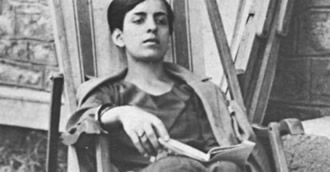
Maria Polydouri (1 april 1902 – 30 april 1930)
De Engelse journalist en schrijver Edgar Wallace werd geboren in Greenwich op 1 april 1875. Zie ook alle tags voor Edgar Wallace op dit blog.
Uit: King Kong (samen met Merian C. Cooper)
“Come aboard! Come aboard!” cried Driscoll. “Den-ham’s wild to hear from you. Have you found the girl?”
In the darkness Weston’s cheer evaporated. He made a wry face and said nothing, but followed Driscoll’s springing stride aft and up a ladder to the lighted cabin.
This low inclosure was invitingly spick and span, but it was furnished with the spartan simplicity which characterizes womanless quarters. The sole decorations were a mirror on one wall and a well filled pipe rack on another, unless one counted an overcoat or two with attendant hats. For the rest there were only four chairs, an oblong table of the broad squat sort favored by men who like to spread out maps for studying, an open box containing black corrugated iron spheres larger than oranges but smaller than grapefruit, and a brightly polished brass cuspidor which stood close by a foot of one of the two men waiting in the cabin.
This man was lean, and of no more than middle height. Behind a heavy moustache, his hard jaw worked slowly upon a generous mouthful of plug cut. He was in vest and shirt-sleeves. Above these a captain’s uniform cap lent an air of command, but this did not keep him from stepping definitely aside in order to leave the center of the stage to his companion.
His companion was just such a well tailored, well groomed man of thirty-five as you might run into at any stock broker’s desk; although there you would rarely encounter such an air of solid power, of indomitable will. Bright brown eyes, shining with an unquenchable zest for the adventure of living, flashed toward Weston as he entered, and an impatient voice said without preliminary:
“Weston! I was just going ashore to ring you up.”
“If I’d known that I’d have waited,” Weston answered, eyeing his wet shoes.
“Shake hands with the Skipper, Captain Englehorn,” Denham pushed on.
The man in the captain’s cap, turning from a center shot into the bright cuspidor, held out a rough, thick hand and after it had been shaken moved the box of corrugated iron spheres to make more room at the table for Weston’s chair.”

Edgar Wallace (1 april 1875 – 10 februari 1932)
Cover luisterboek
De Duitse schrijver Carl Sternheim werd als zoon van een joodse bankier geboren op 1 april 1878 in Leipzig. Zie ook alle tags voor Carl Sternheim op dit blog.
Uit: Napoleon
„Immer hitziger wurde sein Trieb, dem zu Bedienenden sättigende Kost zu bieten. Gewürz und Zutat sah er nur in dem Sinn, wie sie die bestellte Speise fest und ausdauernd machen möchten. Es bildete sich in seiner Vorstellung der Raum des leeren Magens, in den er wie aus Betonklötzen die Nahrung baute. Ging der Gesättigte, der schlappen Schrittes gekommen, wuchtig zur Tür hinaus, hing Napoleons Blick an dem Schreitenden, als sei dessen Lebendigkeit sein Werk. Er brauchte das Bewußtsein schöpferischer Tat, um vor sich bestehen zu können, und steigerte es allmählich zur Überzeugung, ohne ihn und seine Pflege sei die Lebensarbeit der Betroffenen nicht möglich. Diese festzustellen, merkte er die Namen der Gäste, nahm an ihrem Vorwärtskommen teil. Es geschah, als er am freien Tag durch die Wege der Versailler Parks schritt, in der Einbildung, er habe gerade eine riesige Wurst mit den Höchstwerten menschlicher Nahrung gestopft und schnitte den Wartenden Scheiben herunter, daß aufschauend sein Auge zu einem jungen Weibe fiel, das am entblößten Busen ein Kind hängen hatte. Gebannt wurzelte Napoleon am Boden und prägte sich in aufgetane Sinne das Bild rosiger, geblähter Rundheiten an der Frau und dem Säugling ein. War das eine Apotheose seiner Träume von kraftvoller Nahrung und ihrem besten Verbrauch! Er liätte an die Nährende niederfallen und durch Umschlingung ihres und des Kindes Leibes an dem erhabenen Vorgang teilnehmen mögen. Das geschaute Bild verließ ihn nicht und veranlaßte ihn, flüssigen Stoffen gesteigerte Aufmerksamkeit zu schenken; dann aber hob es den Wert der Frau, der bis heute ihrer geringeren Lust zum Essen wegen für seine Welt nicht groß gewesen war, sich jetzt aber unter einem anderen Gesichtspunkt auf das beste ins große Tableau tafelnder Menschheit einordnete. Zum ersten Mal besah er das Mädchen an der Anrichte, dem er bisher nur den kräftigen Gliederbau hatte bestätigen müssen, und immer eindringlicher, als prüfe er es auf gewisse ihm nun einleuchtende Möglichkeiten. Er fand, sie nähme als Nahrung zu viel leichtes Zeug, belade sich mit Geblasenem und Aufgerolltem, das im Magen zu einem Nichts zusammenfiele, warnte sie vor Klebrigkeit und Süßem und forderte sie eines Tages geradezu auf, mit ihm irgendwo ein Mahl zu nehmen, das bis ins kleinste von ihm zusammengestellt, in seinem Wert für sie erörtert werden solle. Das Mädchen nahm des Mannes Kauderwelsch für einen Umschweif, willigte ein, und sie gingen an einem der nächsten Tage gemeinsam ein Stück über Land und traten in einen Gasthof ab. Dort verschwand Napoleon und erklärte zurückkommend der schmollenden Suzanne, er habe in der Küche selbst bis ins kleinste vorgesorgt.“
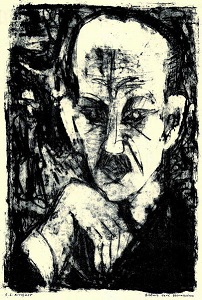
Carl Sternheim (1 april 1878 – 3 november 1942)
Sternheim. Lithografie door Ernst Ludwig Kirchner, 1916
De Franse schrijver Edmond Eugène Alexis Rostand werd geboren in Marseille op 1 april 1868. Zie ook alle tags voor Edmond Rostand op dit blog.
Uit: Cyrano de Bergerac
«Scène II – LES MEMES, CHRISTIAN, LIGNIERE, puis RAGUENEAU et LE BRET
CUIGY
Lignière !
BRISSAILLE, riant
Pas encor gris !…
LIGNIERE, bas à Christian
Je vous présente ?
Signe d’assentiment de Christian.
Baron de Neuvillette.
Saluts.
LA SALLE, acclamant l’ascension du premier lustre allumé
Ah !
CUIGY, à Brissaille, en regardant Christian
La tête est charmante.
PREMIER MARQUIS, qui a entendu
Peuh !…
LIGNIERE, présentant à Christian
Messieurs de Cuigy, de Brissaille…
CHRISTIAN, s’inclinant
Enchanté !…
PREMIER MARQUIS, au deuxième
Il est assez joli, mais n’est pas ajusté
Au dernier goût.
LIGNIERE, à Cuigy
Monsieur débarque de Touraine.
CHRISTIAN
Oui, je suis à Paris depuis vingt jours à peine.
J’entre aux gardes demain, dans les cadets.
PREMIER MARQUIS, regardant les personnes qui entrent dans les loges
Voilà
La présidente Aubry !
LA DISTRIBUTRICE
Oranges, lait…
LES VIOLONS, s’accordant
La… la… »

Edmond Rostand (1 april 1868 – 2 december 1918)
Gérard Depardieu (Cyrano de Bergerac) en Vincent Pérez (Christian de Neuvillette) in de gelijknamige Franse film uit 1990
De Zwitserse dichter, schrijver en vertaler Armel Guerne werd geboren in Morges op 1 april 1911. Zie ook alle tags voor Armel Guerne op dit blog.
Le Poids Vivant de la Parole
On peut écrire, et l’on écrit ;
On peut se taire, et l’on se tait.
Mais pour savoir que le silence
Est la grande et unique clef,
Il faut percer tous les symboles.
Dévorer les images,
Écouter pour ne pas entendre,
Subir jusqu’à la mort
Comme un écrasement
Le poids vivant de la parole.
Mentir la Vie
Il neige de la mort sur les routes du monde
Il pleut sur l’eau des océans comme une pâte
Et le vent de la nuit sans le levain du deuil
Passe à travers avec indifférence
Et n’aérant nulle tristesse de son poids.
Les malheureux, déchirés du commencement
Qu’ils n’ont jamais connu, n’ont pas de fin non plus!
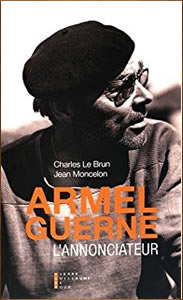
Armel Guerne (1 april 1911 – 9 oktober 1980)
Cover
De Duitse dichter Friedrich Güll werd geboren op 1 april 1812 in Ansbach. Zie ook alle tags voor Friedrich Güll op dit blog.
Sonntagsfrühe
Von den Bergen glänzt der Schnee,
Auf den Wiesen blitzt der Tau,
In der Tiefe ruht der See,
Spiegelt rein des Himmels Blau;
In die Wasser klar und helle
Schaut vom Felsen die Kapelle.
Stille rings im weiten Raum,
Still der Wald und still das Ried;
Leise flüstert nur der Baum,
Leise nur des Vogels Lied;
Fernher schallet fromm Geläute:
Sonntag, Sonntag ist es heute!
Es wogt die Saat, es wallt der See,
Am Waldessaume ruht das Reh;
Ich steh’ gelehnt am Wiesenhag
Und könnte so den ganzen Tag
Der heil’gen Stille lauschen.
Kein Vogel sitzt…
Kein Vogel sitzt in Flaum und Moos
in seinem Nest so warm:
als ich auf meiner Mutter Schoß,
auf meiner Mutter Arm.
Und tut mir weh mein Kopf und Fuß,
vergeht mir aller Schmerz:
gibt mir die Mutter einen Kuss
und drückt mich an ihr Herz.
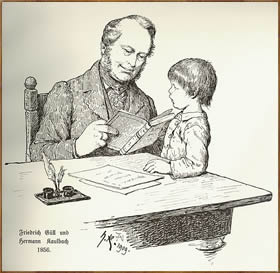
Friedrich Güll (1 april 1812 – 24 december 1879)
Friedrich Güll und sein Schüler door Hermann Kaulbach, 1910
De Franse schrijver Antoine François Prévost werd geboren op 1 april 1697 in Hesdin, Artois. Zie ook alle tags voor Antoine Prévost op dit blog.
Uit: Manon Lescaut (Vertaald door D. C. Moylan)
“I should have passed on, satisfied with this explanation, if my attention had not been arrested by the cries of an old woman, who was coming out of the inn with her hands clasped, and exclaiming:
“A downright barbarity!–A scene to excite horror and compassion!” “What may this mean?” I enquired. “Oh! sir; go into the house yourself,” said the woman, “and see if it is not a sight to rend your heart!” Curiosity made me dismount; and leaving my horse to the care of the ostler, I made my way with some difficulty through the crowd, and did indeed behold a scene sufficiently touching.
Among the twelve girls, who were chained together by the waist in two rows, there was one, whose whole air and figure seemed so ill—suited to her present condition, that under other circumstances I should not have hesitated to pronounce her a person of high birth. Her excessive grief, and even the wretchedness of her attire, detracted so little from her surpassing beauty, that at first sight of her I was inspired with a mingled feeling of respect and pity.
She tried, as well as the chain would permit her, to turn herself away, and hide her face from the rude gaze of the spectators. There was something so unaffected in the effort she made to escape observation, that it could but have sprung from natural and innate modesty alone.
As the six men who escorted the unhappy train were together in the room, I took the chief one aside and asked for information respecting this beautiful girl. All that he could supply was of the most vague kind. “We brought her,” he said, “from the Hospital, by order of the lieutenant—general of police. There is no reason to suppose that she was shut up there for good conduct.
“I have questioned her often upon the road; but she persists in refusing even to answer me. Yet, although I received no orders to make any distinction between her and the others, I cannot help treating her differently, for she seems to me somewhat superior to her companions. Yonder is a young man,” continued the archer, “who can tell you, better than I can, the cause of her misfortunes. He has followed her from Paris, and has scarcely dried his tears for a single moment. He must be either her brother or her lover.”
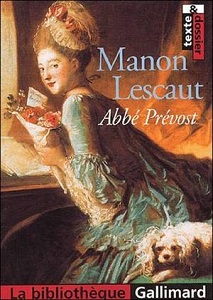
Antoine Prévost (1 april 1697 – 23 december 1763)
Cover
De Franse politicus, schrijver en filosoof Joseph, comte de Maistre werd geboren in Chambéry op 1 april 1753. Zie ook alle tags voor Joseph de Maistre op dit blog.
Uit: Considérations sur la France
« Détrompez-vous une fois de ces doctrines désolantes, qui ont déshonoré notre siècle et perdu la France. Déjà vous avez appris à connaître les prédicateurs de ces dogmes funestes; mais l’impression qu’ils ont faite sur vous n’est pas effacée. Dans tous vos plans de création et de restauration, vous n’oubliez que Dieu; ils vous ont séparé de lui, ce n’est plus que par un effort de raisonnement que vous élevez vos pensées jusqu’à la source intarissable de toute existence. Vous ne voulez voir que l’homme, son action si faible, si dépendante, si circonscrite, sa volonté si corrompue, si flottante; et l’existence d’une cause supérieure n’est pour vous qu’une théorie. Cependant elle vous presse, elle vous environne: vous la touchez, et l’univers entier vous l’annonce. Quand on vous dit que sans elle vous ne serez forts que pour détruire, ce n’est point une vaine théorie qu’on vous débite, c’est une vérité pratique fondée sur l’expérience de tous les siècles, et sur la connaissance de la nature humaine. Ouvrez l’histoire, vous ne verrez pas une création politique; que dis-je! vous ne verrez pas une institution quelconque, pour peu qu’elle ait de force et de durée, qui ne repose sur une idée divine, de quelque nature qu’elle soit, n’importe: car il n’est point de système religieux entièrement faux. Ne nous parlez donc plus des difficultés et des malheurs qui vous alarment sur les suites de ce que vous appelez contre-révolution. Tous les malheurs que vous avez éprouvés viennent de vous; pourquoi n’auriez-vous pas été blessés par les ruines de l’édifice que vous avez renversé sur vous-mêmes? La reconstruction est un autre ordre de choses; rentrez seulement dans la voie qui peut vous y conduire. Ce n’est pas par le chemin du néant que vous arriverez à la création. »
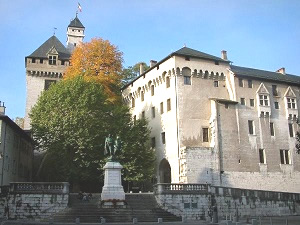
Joseph de Maistre (1 april 1753 – 26 februari 1821)
Het kasteel van Chambéry met het standbeeld van Xavier en Joseph de Maistre
